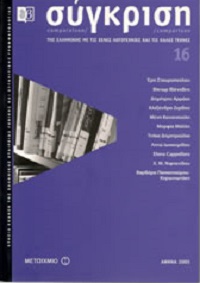Greek Translations of Divine Comedy
Abstract
Τhis paper summarises the findings of the bibliographical research into the translatory fortune of Dante's Divine Comedy in Greek, containing up to date relative information. We have 55 translations (90% in verse) - only 5 of which include the whole text, and 6 the Inferno. On the basis of the research, an increase in the interest in the work is noticed in 1870's and 1880's (mostly through the Eptanesians' familiarity with the kalian culture); this rekindled at the beginning of 20th century (with a gradual decline until the post World War II period) and it renewed (chiefly under the influence of modernist poets) from 1980 up to now. After some comments on the objectives and the achievements of the most representative translations, it is concluded that the one by Nikos Kazantzakis 01934,21954-1955) remains the best of the available complete translations. It is also suggested that a full edition of a Divine Comedy s prose version, including a rich commentary, should be produced in Greek, apart from the noteworthy contemporary efforts of the «poema sacro»'s versified translations.
Article Details
- How to Cite
-
Αρμάος Δ. (2017). Greek Translations of Divine Comedy. Comparison, 16, 60–82. https://doi.org/10.12681/comparison.10083
- Issue
- Vol. 16 (2005)
- Section
- Articles

This work is licensed under a Creative Commons Attribution-NonCommercial-ShareAlike 4.0 International License.
Authors who publish with this journal agree to the following terms:
- Authors retain copyright and grant the journal right of first publication with the work simultaneously licensed under a Creative Commons Attribution Non-Commercial License that allows others to share the work with an acknowledgement of the work's authorship and initial publication in this journal.
- Authors are able to enter into separate, additional contractual arrangements for the non-exclusive distribution of the journal's published version of the work (e.g. post it to an institutional repository or publish it in a book), with an acknowledgement of its initial publication in this journal.
- Authors are permitted and encouraged to post their work online (preferably in institutional repositories or on their website) prior to and during the submission process, as it can lead to productive exchanges, as well as earlier and greater citation of published work (See The Effect of Open Access).




